Speaking With Confidence
India White • August 13, 2021

Everyone is afraid of something. Some people are stricken with fear upon sight of a spider. Others can’t stand the sight of party clowns. And others still, quite ironically, are scared of being scared. But, with the vast array of fear and anxiety-inducing factors out there in the world, there are few as prevalent and as pervasive as glossophobia, the fear of public speaking. At just the mere thought of speaking in public, glossophobes can experience intense dizziness, nausea, increases in heartbeat, hyperventilation, muscle tension, sweating, and trembling. Granted, glossophobia is not the most common phobia in the world nor is it the most pressing or surprising out there. However, speaking in public, even if you’re not a glossophobe, is nerve-inducing work.
This makes sense because humans are naturally social creatures. As such, we crave the acceptance of our peers. Being seen as credible or intelligent is almost a guaranteed track to status within a community. This is typically why people are so scared of public speaking; they falsely believe that if they fail in front of an audience, they will lose status and eventually, become ostracized. But, in no way is this true. Fears and anxieties cause people to overestimate the stakes of their speaking, making them believe it will heavily impact their status/credibility, feeding back into the fear. It’s a vicious cycle, but one you can break out of.
First things first, public speaking is not a special skill! And your audience is not judging how good your speaking capabilities are. I repeat, your audience is not trying to pick out the most miniscule things to call you out on. That’s ridiculous! When you listen to other people speaking, are you trying to pinpoint “Oh, they made a grammatical mistake there” or “hmm, I think that was a stutter too many, I’m gonna have to dock points from their score?” Are you even keeping a score? No! You’re just trying to hear their ideas. Granted, the more engaging the speaker and the fewer blatant mistakes they make, the easier it is to accept those ideas. But that’s the key: blatant mistakes. No one is going to sweat you for the small stuff like a stutter here and there. And even still, the mistakes you find blatant while talking are probably barely noticeable to the audience. In psychology, there’s something called the Spotlight Effect: a phenomenon in which people tend to believe they are being noticed more than they really are. Especially when you’re speaking publicly, you will unconsciously over exaggerate how much your audience is noticing your small mistakes. Just remember that all public speaking really is, is conveying your ideas to another person. It doesn’T necessarily matter if there are 5 or 500 people in front of you, treat your audience as though you were talking to them individually. Mitigate the stress you place on yourself to perform drastically differently than if you were simply just talking to your friend.
Of course, this is easier said than done, but there are some strategies to help you speak with confidence. First, and most importantly, review your material until you truly know it. That doesn’t mean memorizing it, as that typically leads to errors if you get distracted or lose your place. A note: be sure to master your introduction. This is usually where most people mess up. If you’ve ever noticed, once you start off flawlessly, your nerves naturally calm down as you get further and further into your speech. Remember, you know your stuff, just get it out there to the audience. Practice and practice, practice makes perfect but it also makes you more confident.
Second, try videotaping yourself speaking, that way you will better understand what your audience sees and hears. Make adjustments to your posture, phrases, facial expressions, hand gestures, etc as needed from the recording. Then record it again and again until you’re satisfied.
Finally, be prepared for questions, after and during your presentation . You don’t want to perform a fantastic speech and then fumble with your words when answering the first question asked. Just jot down some questions you predict will be asked and think of answers beforehand. Remember, don’t memorize. If you know your stuff, you won’t have to. And even if you don’t know the answer, give’em a confident, “Great question! As of right now, I can’t give you an answer that I am satisfied with. May I reach out to you with an answer after this presentation, speech, birthday party, whatever?” That way, you can dodge making a fool out of yourself, whilst also not admitting full ignorance.
Remember, the key to giving a good presentation is just confidence. Even if your content is slightly lacking, if you convey it in a confident manner, people will believe you know what you’re talking about. Just remember: practice, practice, practice. And don’t be so hard on yourself. You know your stuff and, most importantly, you know you. You got this!
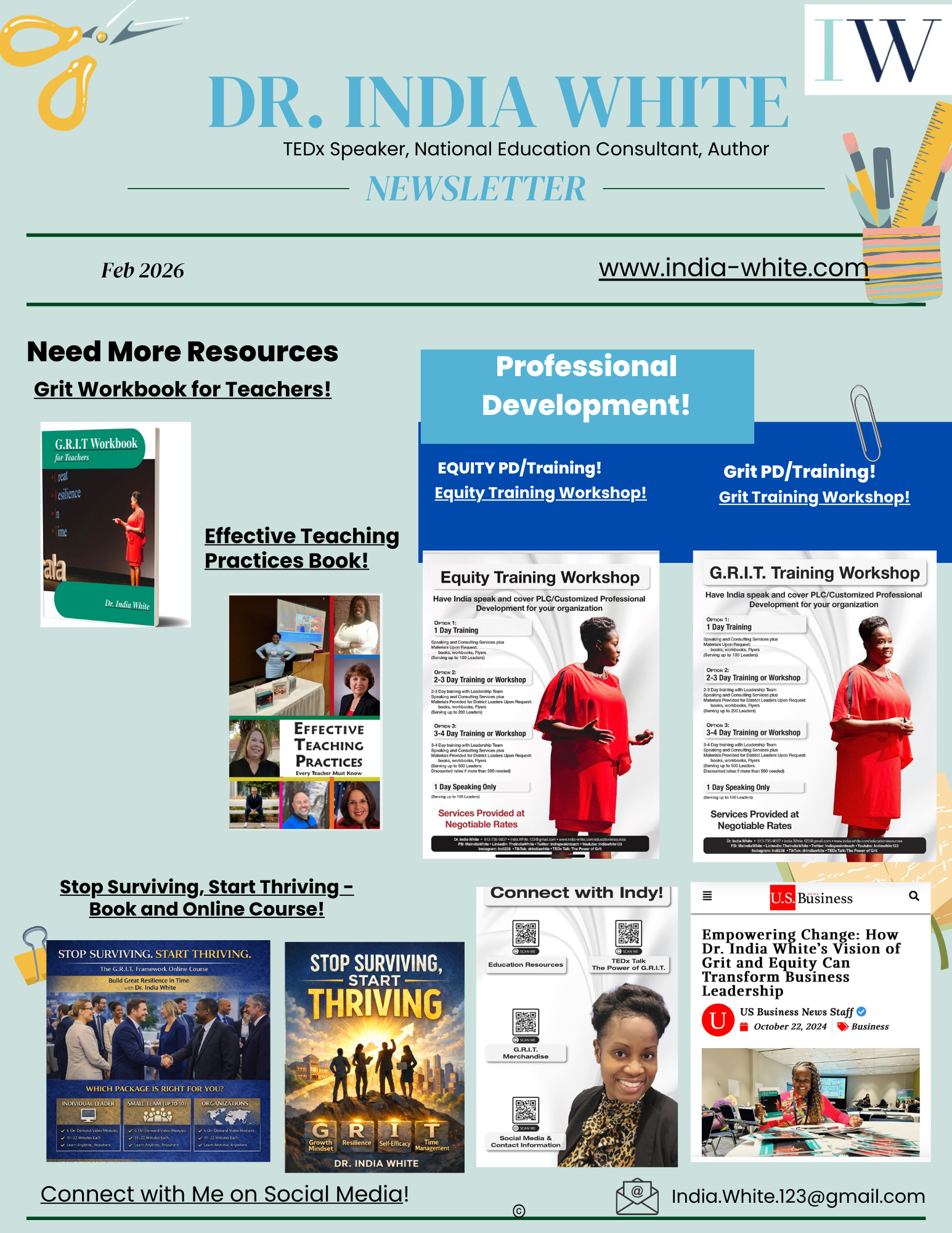
February Energy, Connection, and Celebration—Our Newsletter Is Live! 🎉 I’m so excited to share our February Newsletter, and whew—what a month it has already been! February has been full of learning, laughter, inspiration, and powerful connections, all while we celebrate Black History Month and continue the work of building equity and excellence in education. One of the biggest highlights this month was presenting aUtah Council of Teachers of Mathematics (UCTM)**. Connecting with educators in person in Utah was such a joy. The energy in the rooms, the thoughtful questions, the shared commitment to students—it reminded me why I love this work so much. Teachers showed up curious, gritty, and ready to grow, and I left feeling deeply encouraged. At the same time, I had the opportunity to connect with educators online through Florida Distance Learning Association (FDLA), and let me tell you—virtual spaces can be just as powerful! Engaging with teachers across distances, sharing ideas, and learning together in real time was an absolute blast. Whether in Utah or online, the common thread was clear: educators are hungry for tools that help students thrive. And February isn’t slowing down yet! I’m counting down the days as I prepare to serve as a keynote speaker for the Junior League of Sarasota at the end of the month. I’m truly honored and excited to share space with leaders who are committed to impact, service, and community transformation. This month’s newsletter captures all of that momentum—where I’ve been, what’s coming next, and how we can stay connected. If you haven’t checked it out yet, I invite you to take a look, share it, and reach out. Let’s collaborate, dream big, and keep building together. February is reminding me that connection fuels purpose—and I’m grateful for every educator, leader, and partner walking this journey with me. Let’s keep celebrating, learning, and getting gritty—together. 💛✨
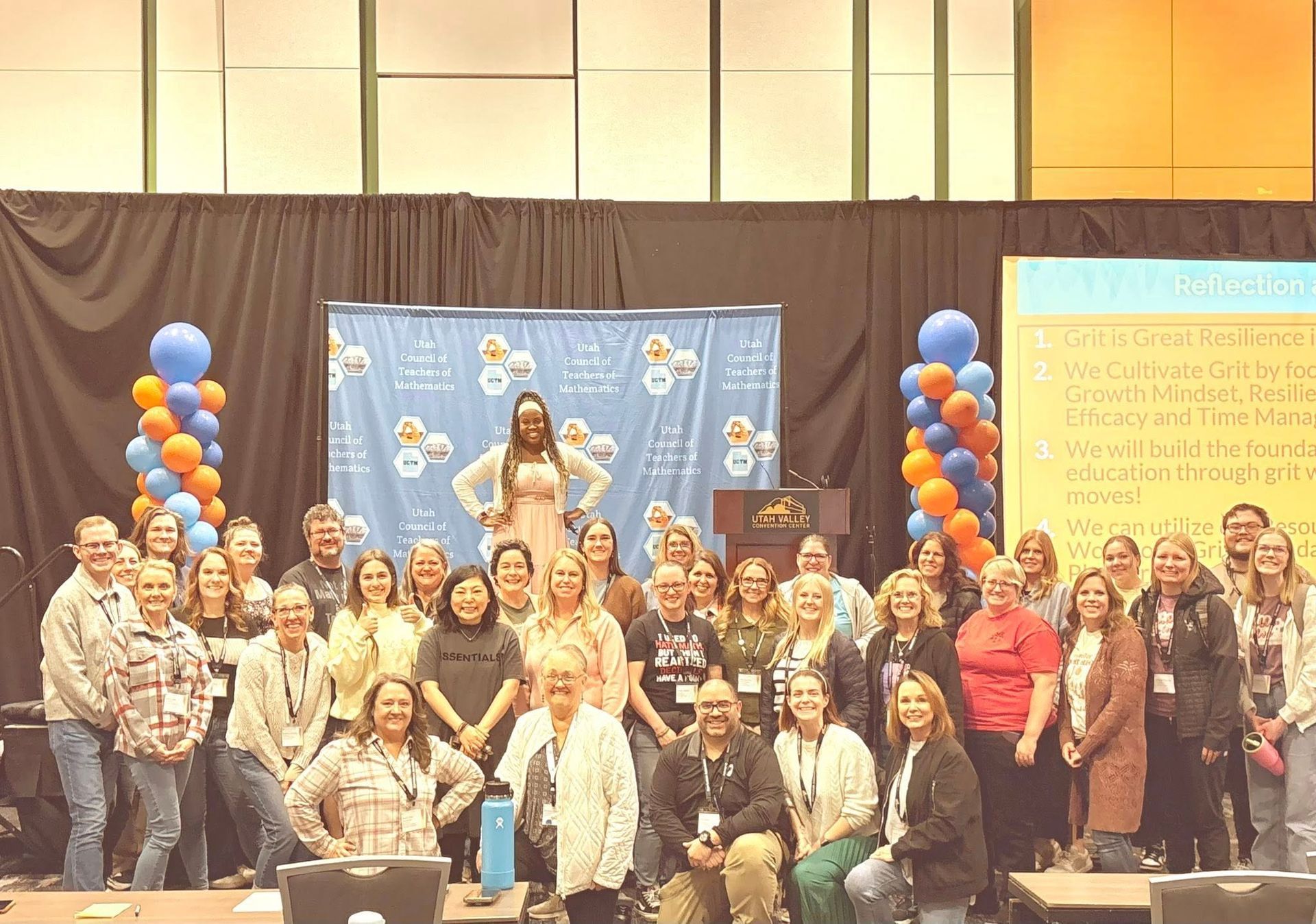
🌟 What an ABSOLUTELY PHENOMENAL time at UCTM presenting on grit games! 🎉 The educators in Utah are truly AMAZING! I feel so blessed to share insights on grit and connect with new friends—cheering each other on to get pumped up again! 💪✨ Had a hilarious time trying to throw hoops with Dan (I only made ONE shot—let’s just say my accuracy needs some work! 😂🏀). It was fantastic to connect with such inspiring friends and leaders in the math community, sharing exciting updates that Savvas has for all the math teachers out there! 📚🔍 BIG shoutout to the UCTM board, Jackie, the Savvas team, and all the incredible Utah educators! Thanks for a blast of a time! 🚀🙌 #GritAndGames #UpliftEducators #MathMagic #ConnectAndInspire #SavvasUpdates #FunInEducation ✨❤️ (I don’t own music copyright)
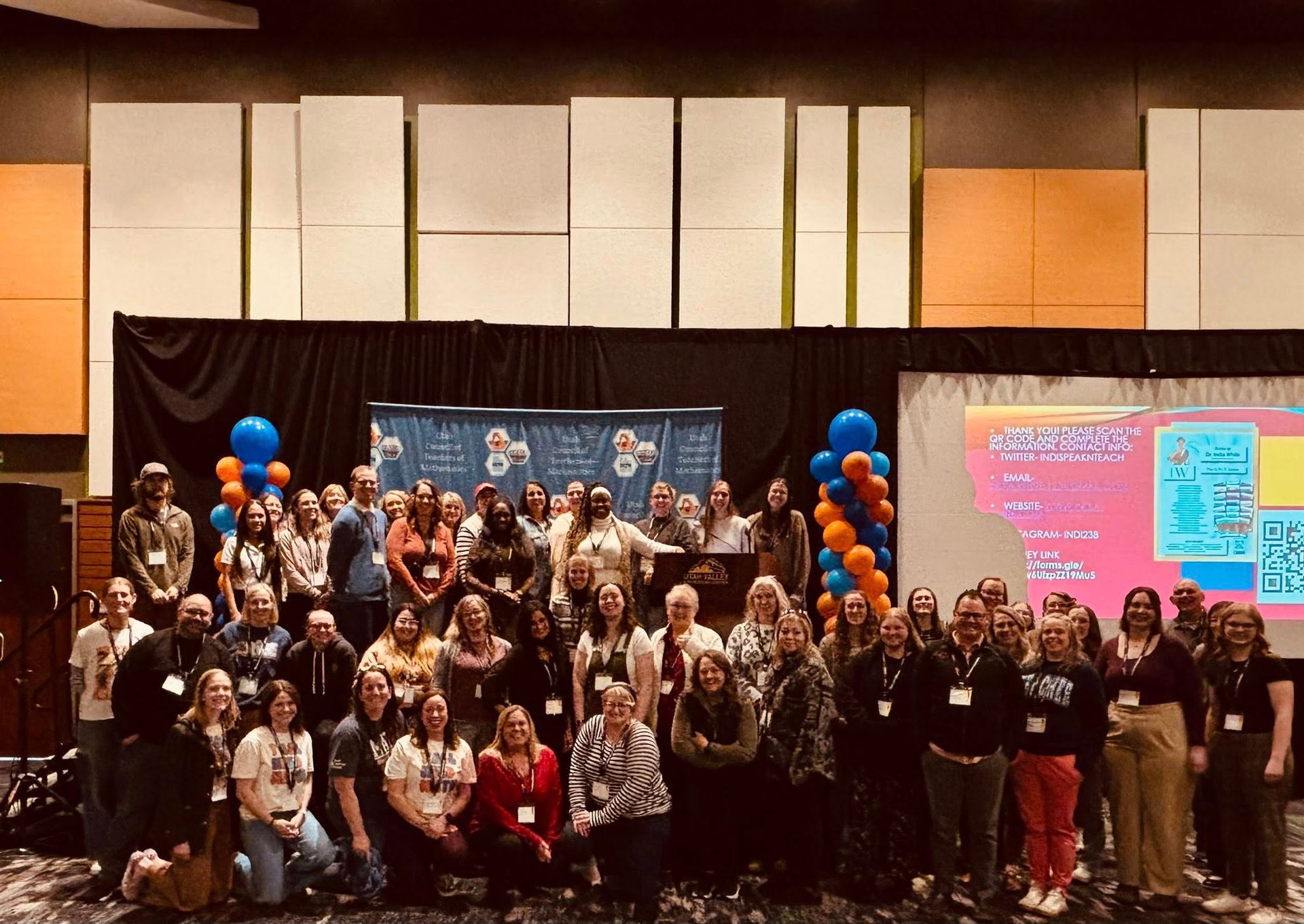
I am incredibly grateful for the opportunity to speak at UCTM 2026. The energy in the rooms was powerful, and several sessions were filled with educators eager to grow, reflect, and strengthen their practice—especially during my session on building gritty thinking in the classroom. Experiences like this remind me why this work matters so deeply. Teachers came ready to engage in meaningful conversations about productive struggle, perseverance, and how to move beyond surface-level engagement into true student thinking. One of the highlights was hearing how excited educators were about the new Savvas math books and the way these resources support conceptual understanding, collaboration, and confidence for learners at all levels. When curriculum, instruction, and mindset align, we truly begin to bridge the gap for students. At the heart of these conversations was the powerful connection between Thinking Classrooms and my G.R.I.T. Framework—Growth Mindset, Resilience, Self-Efficacy, and Time Management. Together, they create learning environments where students don’t just solve problems, they learn how to persist, reflect, and believe in themselves. Building grit starts with a growth mindset. In a thinking classroom, struggle is not a setback—it’s evidence of learning. Teachers can normalize this by celebrating multiple strategies, modeling mistakes, and using language that reframes being “stuck” as part of the thinking process. When students understand that effort and revision are expected, they engage more deeply and take greater ownership of their learning. Resilience grows through collaboration. Thinking classrooms thrive when students work together, share ideas, and wrestle with concepts as a team. Random grouping, structured roles, and intentional math discourse help students learn that perseverance is strengthened in community. When learners support one another, they build confidence and stamina to tackle challenging tasks. Self-efficacy develops when student thinking is valued. Using vertical non-permanent surfaces like whiteboards lowers the fear of making mistakes and encourages risk-taking. Asking students to explain their reasoning and highlighting their ideas—whether complete or still developing—signals that their thinking matters. Over time, students begin to see themselves as capable mathematicians. Time management is another critical component of grit. Teachers can support this by breaking tasks into phases, using visual timers, and guiding students to reflect on how they used their time. These habits help students learn to pace themselves, stay focused, and persist through complex problems—skills that extend far beyond the math classroom. The questions we ask also shape gritty thinking. Instead of rescuing students, we can ask questions that prompt reflection and strategy: What do you already know? What have you tried so far? What could you try next? These questions keep students engaged in the process and strengthen their independence as thinkers. Finally, reflection brings it all together. Ending lessons with opportunities for students to reflect on effort, strategies, and moments of perseverance reinforces that grit is just as important as correctness. When we celebrate persistence as much as achievement, students learn that growth happens over time. UCTM 2026 was a powerful reminder that educators everywhere are committed to creating classrooms where students feel supported, challenged, and empowered. I am grateful for every teacher who showed up ready to learn, collaborate, and push their thinking. Let’s stay gritty, keep learning together, and continue bridging the gap so every learner has the opportunity to thrive.
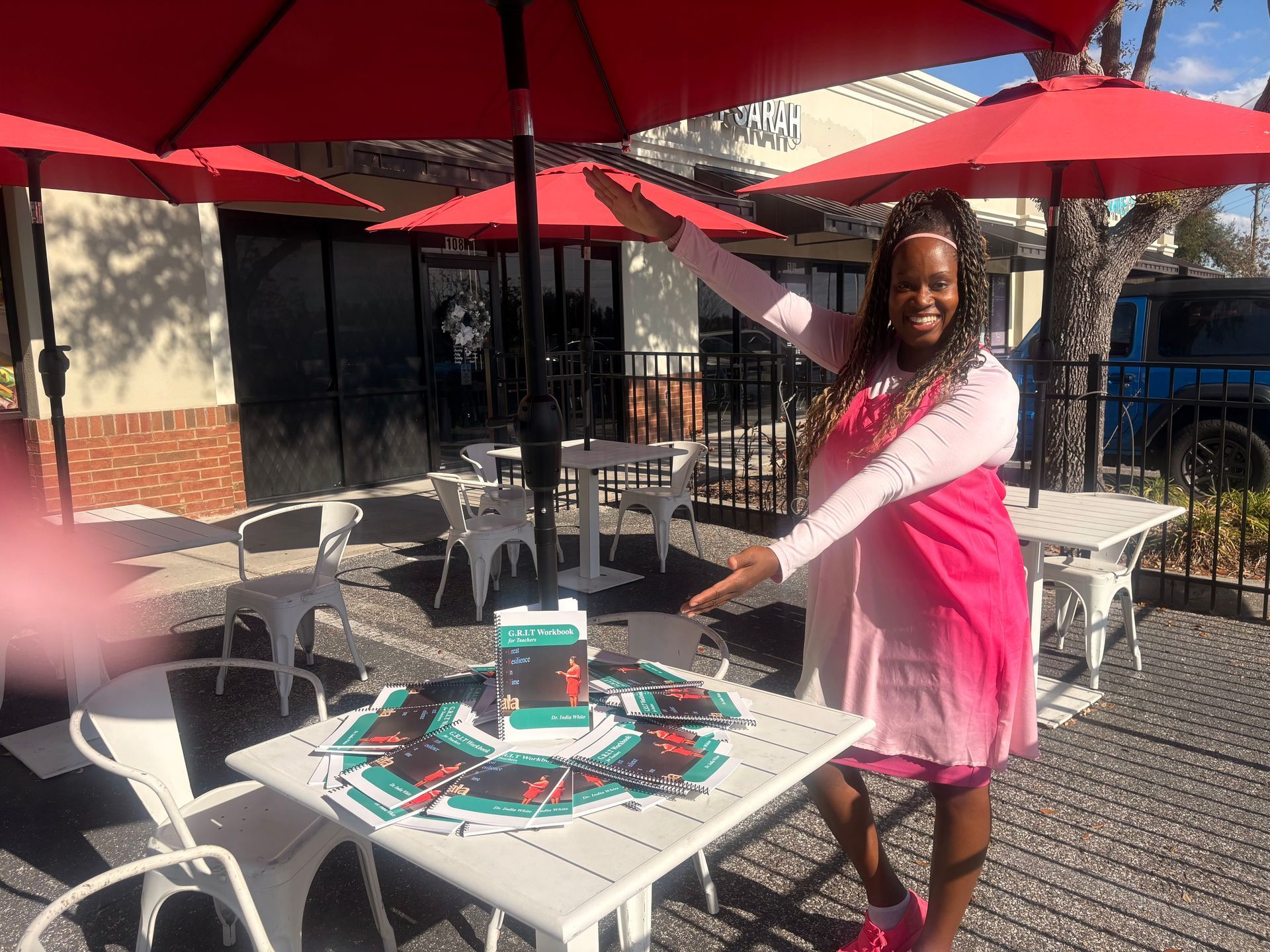
🎉 Exciting news, teachers! 🎓✨ I’m gearing up for an amazing trip to UCTM, and I want YOU to join the fun! Don’t forget to check out my latest video where I reveal some fantastic door prizes that could be yours! 🎁🙌 Let’s connect, learn, and make unforgettable memories together. Click the link and find out how you can win! 🚀💼 👉✨ #UCTM2026 #TeachersRock #drindiawhite #nabse @#foryou (I don’t own copyright to music ) Let’s make this an event to remember! 🙏🎉

It’s Official! The 60-Day Weight Loss & G.R.I.T. Discipline Reset Has Launched 🎉 I’m excited to officially announce the launch of my newest transformational experience—the 60-Day Weight Loss & G.R.I.T. Discipline Reset! This course has been thoughtfully designed for individuals who are ready to stop starting over and finally build the discipline, consistency, and mindset needed to see lasting results. Led by Dr. India White, this 8-week online course goes beyond traditional weight loss programs. It focuses on sustainable change through my proven G.R.I.T. Framework: Growth Mindset, Resilience, Self-Efficacy, and Time Management. This isn’t about extremes or quick fixes—it’s about building habits that fit real life and last well beyond 60 days. What’s Included Participants receive access to: * An introductory video to reset your mindset and set clear expectations * Eight weekly modules that build discipline step by step * A conclusion video to help you transition from a reset to a lifestyle Each week is intentionally structured to help you strengthen both your body and mind, so progress doesn’t disappear once motivation fades. Why This Course Works So many weight loss programs focus only on what to eat or how to exercise—but they ignore the mental discipline required to stay consistent. This course fills that gap. You’ll learn how to: * Stay resilient during setbacks * Manage your time realistically * Build confidence through small, sustainable wins * Create routines that work even on busy days To deepen the experience, I highly encourage participants to pair the course with the 60-Day Weight Loss G.R.I.T. Workbook, available on Amazon. The workbook provides daily reflections, habit tracking, and accountability tools that align with each week of the course. Who This Course Is For This course is perfect for: * Individuals ready to lose weight with structure and purpose * Busy professionals, educators, leaders, and entrepreneurs * Fitness trainers and wellness professionals * Anyone seeking discipline, clarity, and long-term results Enroll Today If you’ve been waiting for the right time to recommit to your health, this is it. The 60-Day Weight Loss & G.R.I.T. Discipline Reset course is now live and ready for you. 👉 Click the link to purchase and enroll today 👉 Start your 60-day reset 👉 Build discipline that lasts a lifetime Your healthiest, most disciplined self is within reach—and G.R.I.T. is the bridge to get you there.
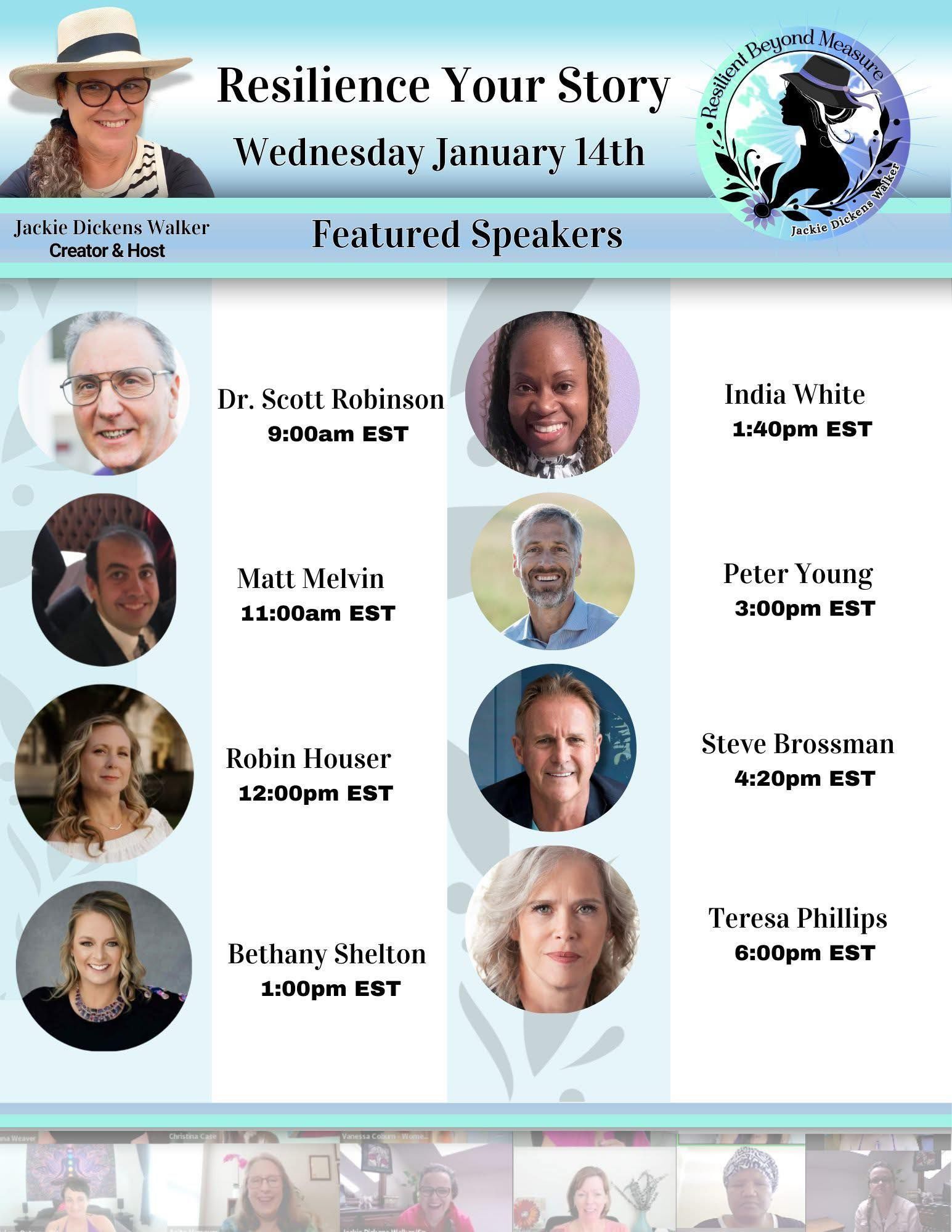
From Homelessness to Hope: Moving from Surviving to Thriving at Resilient Beyond Measure Serving as a keynote speaker at the Resilient Beyond Measure Conference was not only fun, it was deeply meaningful. The room was filled with leaders, educators, and purpose-driven individuals who were hungry for more—more clarity, more impact, and more hope. That collective energy reminded me why I continue to show up and share my story. During my keynote, I spoke candidly about my journey—one that did not begin on a stage, in a boardroom, or with titles behind my name. I shared how I once experienced homelessness, uncertainty, and moments where survival was the only goal. There were seasons when simply making it through the day felt like the win. Yet, through grit, faith, discipline, and relentless perseverance, that season did not define my destination. Today, by God’s grace and years of intentional work, I now serve as a math textbook author, educator, national speaker, and entrepreneur, helping impact millions of students, teachers, leaders, and organizations across the nation. My story is living proof that where you start does not dictate where you finish. At the heart of my keynote was a bold challenge: we must stop normalizing survival mode. Survival is reactive. Thriving is intentional. I shared my G.R.I.T. framework, which continues to be the foundation of my work and message: Growth Mindset — shifting from “I can’t” to “I’m learning” Resilience — developing the stamina to rise again and again Self-Efficacy — believing deeply that you are capable and equipped Time Management — aligning time with purpose, not pressure When these four pillars work together, individuals don’t just cope—they transform. One of the metaphors that resonated strongly with the audience was the idea that many of us are living and leading in low-level energy spaces, when we were designed for more. I described this as moving from survival-level “beta rays” toward higher levels of clarity and impact. Beta represents survival mode —stress-driven, reactive, exhausted, and constantly responding to emergencies. Alpha reflects stability and focus —calmer thinking, reflection, and clearer decision-making. Theta symbolizes creativity and deep connection —innovation, vision, and problem-solving begin to flourish. Gamma represents peak performance and transformation —high-level thinking, purpose, alignment, impact, and legacy. Thriving means intentionally moving away from beta-level survival and stepping into gamma-level living and leadership—where our actions are aligned with purpose, vision, and long-term impact. I want to extend my sincere thanks to Jackie Walker for the invitation and opportunity to keynote such a powerful conference. Resilient Beyond Measure created a space where authenticity, healing, and growth were not just encouraged—they were activated. It was truly an honor to serve and connect with such an inspiring community. I was also excited to share my newest book, Stop Surviving, Start Thriving, which expands on the message of the keynote and provides practical tools to help readers move from burnout to breakthrough. The book is accompanied by a new course designed to walk participants step by step through applying the G.R.I.T. framework in real life—not just reading about it, but living it. In addition, leaders are invited to explore the G.R.I.T. Workbook for Leaders, created to support sustainable leadership, confidence, resilience, and intentional growth. If this message resonates with you, I would love to stay connected. Visit my website at www.india-white.com to learn more about my work, speaking engagements, and resources. Both Stop Surviving, Start Thriving and the G.R.I.T. Workbook for Leaders are available today! Whether you are an educator, leader, entrepreneur, or someone simply ready for more, remember this: you were never meant to just survive. With grit, vision, and intention, thriving is not only possible—it’s your calling. With gratitude and grit, Dr. India White
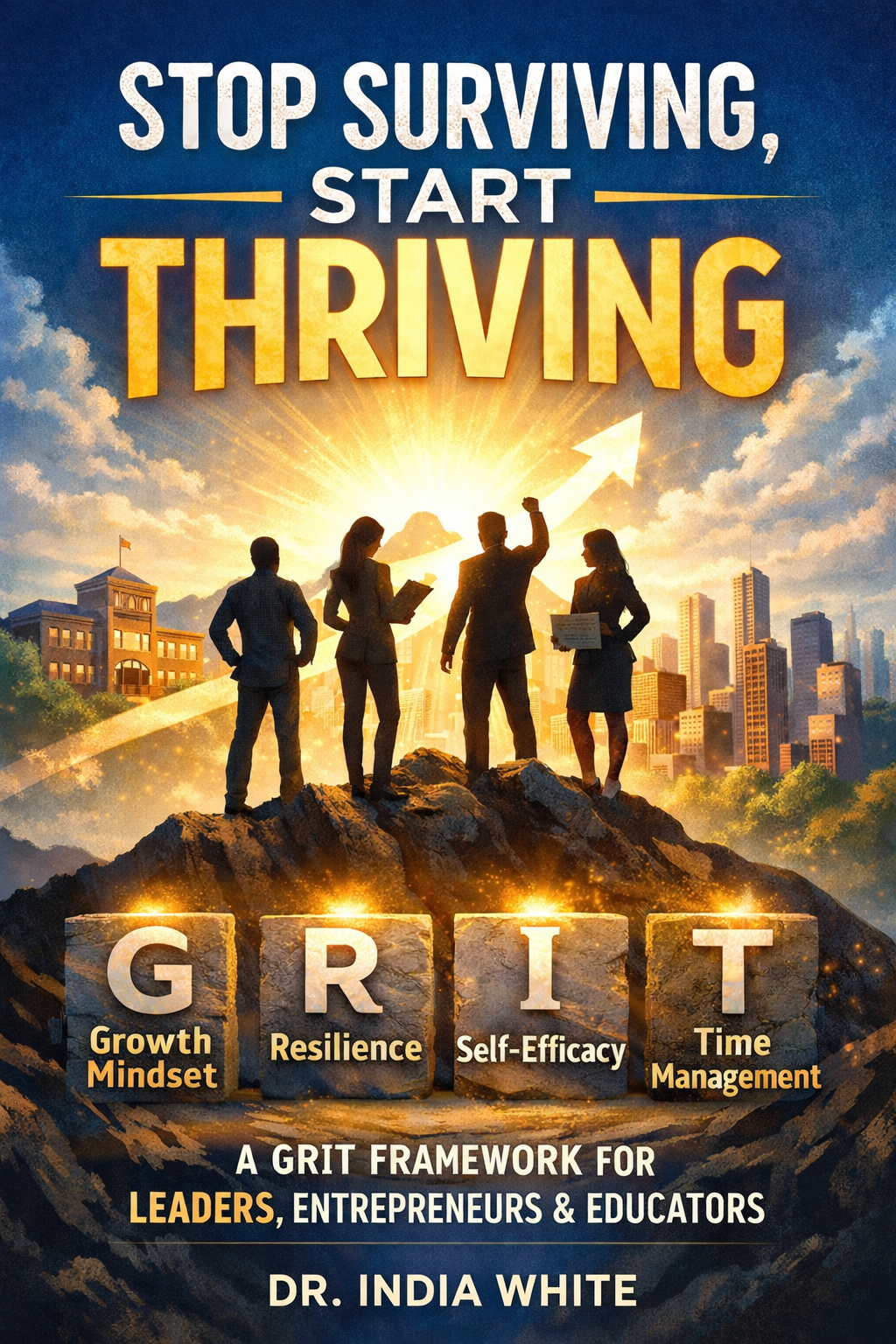
EXCITING NEWS!! I am thrilled to share some incredible news with you all! After months of hard work and dedication, I am proud to announce the launch of my new book, "Stop Surviving, Start Thriving: A Grit Framework for Leaders." This book is designed to empower leaders like you with the insights and strategies needed to elevate your leadership journey and truly thrive in today’s challenging environment. What You’ll Discover in My Book In "Stop Surviving, Start Thriving," I delve into the grit framework that will help you harness your strengths, overcome obstacles, and lead with confidence. Whether you’re an established leader or someone just starting your journey, this book is filled with practical advice and actionable steps to make a meaningful impact. Why This Book Matters: - Transformational Insights: Learn how to shift your mindset from merely surviving to genuinely thriving in your role. - Practical Strategies: Gain access to tools and techniques that you can implement right away to enhance your leadership effectiveness. - Inspiration: Discover stories and examples that will motivate you to take your leadership to the next level. Introducing the Stop Surviving, Start Thriving Course! In addition to the book, I am thrilled to announce the launch of the Stop Surviving, Start Thriving Course! This course complements the book perfectly, providing you with an interactive experience to dive deeper into the concepts covered and gain practical tools that you can use in your daily leadership practice. What to Expect from the Course: - Interactive Learning: Engaging modules that challenge you to think critically and apply lessons to your leadership style. - Real-Life Applications: Practical exercises and discussions that make the concepts relatable and actionable. - Community Support: Join a network of like-minded individuals who are also on their journey to thrive! Where to Find the Book and Course You can grab your copy of "Stop Surviving, Start Thriving" on Amazon by following this link: Amazon Link ( https://a.co/d/c8BNlS9 ). 📖 For those eager to join the course, it's available on my website here: Stop Surviving, Start Thriving Course ( https://www.india-white.com/store/Stop-Surviving-Stop-Thriving-Online-Course-p657410057 ). 🌐 Join Me on This Transformative Journey! I am so excited about this new chapter and can’t wait for you to explore the book and course. Together, let’s stop surviving and start thriving! Your leadership journey begins now. Thank you for your continued support, and I look forward to hearing your thoughts on the book and the course! Let’s thrive together! 💥

I’m Excited to Speak at UCTM 2026 in Utah! I’m thrilled to share that I’ll be a featured speaker at the Utah Council of Teachers of Mathematics (UCTM) 2026 Conference, taking place January 27–28, 2026. This is one of the most energizing professional learning events for math educators in the region, and I’m honored to be part of it alongside so many inspiring teachers, leaders, and advocates for high-quality math instruction. (Utah Council of Teachers of Mathematics Join Me on January 27 Mark your calendars for Tuesday, January 27—I’ll be leading a session all about building grit in the math classroom. In this time together, we’ll explore practical strategies you can use right away to help students move from simply surviving challenging content to thriving academically and personally. We’ll dive into: * Why grit matters for deeper mathematical learning * How to cultivate a Growth Mindset as a classroom culture * Practical moves that strengthen Resilience, Self-Efficacy, and Time Management in students * Tools and classroom structures that support persistence and confidence Teachers will leave with usable ideas that support both student agency and equitable access to rigorous mathematics. Why This Matters for Math Educators Math classrooms are rich with productive struggle, complex problem-solving, and opportunities for sense-making. But without intentional support, students often interpret difficulty as inability. When we teach for grit in math, we help students understand that struggle is not a barrier—it’s a pathway to understanding and confidence. This is especially important in mathematics education because sustained effort and reflection are necessary for students to move from procedural fluency to conceptual understanding, reasoning, and sense-making. About the UCTM Conference The Utah Council of Teachers of Mathematics (UCTM) hosts this annual conference to bring together educators for learning, connection, and inspiration. UCTM 2026 will feature sessions, panels, and presenters focused on best practices in math teaching and leadership. (Utah Council of Teachers of Mathematics[2]) Whether you’re a classroom teacher, instructional coach, math specialist, or school leader, UCTM offers an opportunity to grow your practice and expand your professional learning network. Let’s Thrive Together I hope you’ll attend my session on January 27 and join the conversation about how we can design classrooms that empower students to thrive—academically, socially, and emotionally. When we build grit with intention, students not only persevere—they grow in confidence, agency, and joy in the mathematics. See you in Utah! — Dr. India White References [1]: https://www.utahctm.com/registration-1 "UCTM 2026 Conference Registration" [2]: https://www.utahctm.com/ "Utah Council of Teachers of Mathematics"

It’s Time to Go from Surviving to Thriving Through Grit As a new year begins, many leaders feel pressure to reset, refocus, and recommit—yet they do so while still carrying exhaustion from the year before. Survival mode has become normalized in leadership spaces, often disguised as dedication, resilience, or grit. Research shows that chronic survival mode leads to diminished performance, disengagement, and burnout over time (Maslach & Leiter, 2016). Surviving may keep leaders functioning, but it does not allow them to flourish. This year offers an opportunity to lead differently by embracing grit as Great Resilience in Time. My G.R.I.T. Framework—Growth Mindset, Resilience, Self-Efficacy, and Time Management—is designed to help leaders build capacity over time rather than deplete it. When these four pillars work together, leaders are better equipped to sustain motivation, adapt to challenge, and lead with clarity and care (OECD, 2020). Below are seven research-informed ways leaders can move from surviving to thriving in the new year through grit. Thriving Tip 1: Redefine Grit as Sustainable Persistence Grit is often misunderstood as pushing harder or lasting longer, but research demonstrates that persistence without recovery increases the risk of burnout rather than long-term success (Maslach & Leiter, 2016). Duckworth (2016) emphasizes that grit involves sustained effort toward meaningful goals, not blind endurance. When leaders redefine grit as Great Resilience in Time, they recognize that adaptation, rest, and strategy are essential to persistence. Thriving begins when effort is aligned with purpose and supported by systems that protect wellbeing. Thriving Tip 2: Practice a Growth Mindset in Leadership Decisions A growth mindset allows leaders to view challenges as opportunities to learn rather than threats to competence. Research shows that leaders who believe abilities can be developed are more likely to seek feedback, experiment with new strategies, and foster learning cultures (Dweck, 2006). Within the G.R.I.T. Framework, growth mindset is foundational because it shapes how leaders interpret setbacks and progress. Leaders who thrive consistently ask, “What can I learn from this?” rather than internalizing failure as a fixed trait. Thriving Tip 3: Build Resilience That Includes Recovery Resilience is not about ignoring stress but responding to it effectively. Studies indicate that sustainable resilience requires emotional regulation, access to support, and intentional recovery practices (Hobfoll, 2002). In the G.R.I.T. Framework, resilience means bouncing forward—not simply pushing through. Leaders who thrive schedule recovery as a leadership responsibility, understanding that restoration is directly connected to long-term effectiveness and decision quality (OECD, 2020). Thriving Tip 4: Strengthen Self-Efficacy Through Action Self-efficacy refers to a person’s belief in their ability to execute actions required to achieve specific goals (Bandura, 1997). Strong self-efficacy has been consistently linked to higher motivation, persistence, and performance across leadership contexts. Within the G.R.I.T. Framework, self-efficacy is built through mastery experiences, small wins, and visible progress—not positive thinking alone. Leaders thrive when they intentionally design opportunities for success and reinforce evidence of capability in themselves and others. Thriving Tip 5: Treat Time Management as Energy and Attention Design Time management is not about cramming more tasks into a day; it is about protecting focus and energy for what matters most. Research on cognitive load and attention shows that constant interruption undermines decision-making, creativity, and wellbeing (Maslach & Leiter, 2016). In the G.R.I.T. Framework, time management functions as a leadership system that aligns priorities with purpose. Leaders who thrive design calendars that reflect values, reduce unnecessary complexity, and preserve space for deep work and recovery. Thriving Tip 6: Integrate G.R.I.T. Into Daily Leadership Practice Thriving is not created by intention alone—it requires structure. Research on habit formation and organizational learning confirms that systems outperform willpower over time (Hobfoll, 2002). The G.R.I.T. integration process helps leaders translate belief into action through clear goals, consistent routines, learning through iteration, and healthy tenacity. Leaders thrive when grit is embedded into daily leadership practices rather than relying on motivation alone. Thriving Tip 7: Lead in Ways That Allow Others to Thrive Leadership success is not measured solely by individual achievement but by the environments leaders create. Research on organizational culture and psychological safety shows that people perform best when expectations are high and support is present (OECD, 2020). The G.R.I.T. Framework emphasizes ethical, equity-centered leadership that recognizes different starting points while maintaining excellence. Leaders truly thrive when they help others build Great Resilience in Time as well. A New Year Invitation Thriving does not require perfection, reinvention, or relentless hustle. It requires intention, alignment, and grit defined correctly. As you step into the new year, consider how Growth Mindset, Resilience, Self-Efficacy, and Time Management can work together to support sustainable leadership. This is the year to stop surviving—and start thriving with Great Resilience in Time. References Bandura, A. (1997). Self-efficacy: The exercise of control. W. H. Freeman. Duckworth, A. L. (2016). Grit: The power of passion and perseverance. Scribner. Dweck, C. S. (2006). Mindset: The new psychology of success. Random House. Hobfoll, S. E. (2002). Social and psychological resources and adaptation. Review of General Psychology, 6(4), 307–324. https://doi.org/10.1037/1089-2680.6.4.307 Maslach, C., & Leiter, M. P. (2016). Understanding the burnout experience: Recent research and its implications for psychiatry. World Psychiatry, 15(2), 103–111. https://doi.org/10.1002/wps.20311 OECD. (2020). Supporting teacher and school leader resilience. OECD Publishing. https://doi.org/10.1787/4e6a5e7d-en Visit www.india-white.com for more ways to work together and for more information!
